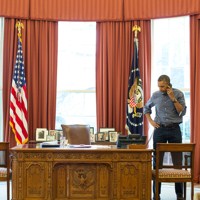Russian troops pouring into Ukraine last weekend were one more wake-up call to America about the scale of Moscow’s ambition. The first came with Stalin’s creation of satellite states in Eastern Europe after World War II; the second was the 1979 Soviet invasion of Afghanistan. Each step reminded Americans that Moscow felt that it had an inherent right to dominate surrounding regions and had no qualms about using force to see that it got what it wanted. Both of these episodes led to American military build-ups and strengthened resolve, thus restoring the containment of Russia. But this latest wake-up may lead in a different direction.
While national security experts talk about the possibility of a new Cold War, something very different may be afoot. Escalating Russian aggression and remilitarization is combining with renewed Japanese nationalism and assertiveness, the economic and military rise of India and China’s growing power, confidence and willingness to challenge the existing order in East Asia. Meanwhile, the United States is experiencing a weariness and unwillingness to act as a global “sheriff,” while the European Union is undergoing a trend toward functional pacifism. Another Cold War seems less likely than a revival of an old international system: a multipolar balance of power.
As any student of Thucydides knows, history may not repeat itself precisely, but it does have recurring patterns. Three types of state systems have been most common throughout history, appearing in many places and many cultures. One is a unipolar system in which one dominant state manages the system. This happened in the Mediterranean world under the Romans, in East Asia during several powerful Chinese dynasties and on a global level during the post-Cold War period of American domination—the “unipolar moment” as Charles Krauthammer called it. A second configuration is a bipolar system in which two roughly equal power blocs balance each other. This, of course, happened during the Cold War. Since direct war between the United States and Soviet Union risked global annihilation, the two blocs sparred using proxy conflict.

